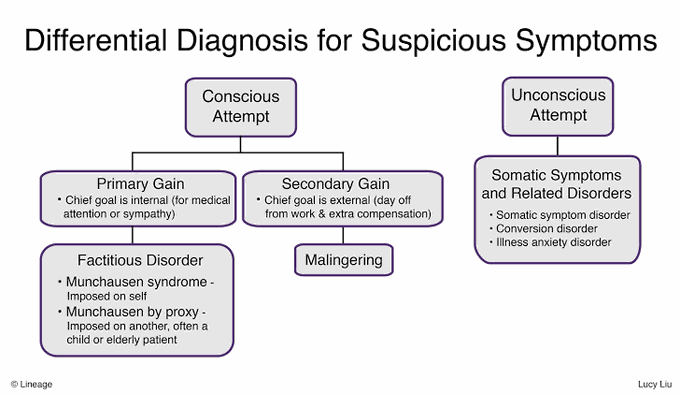

Mishal Shan12 months ago

Factitious Disorder vs Malingering vs Somatic Disorders
Psychiatric illnesses can present with medically unexplained symptoms, which may be elicited consciously or unconsciously. In somatic disorders, the symptoms develop unconsciously, however, there is no medical basis or organic disease to suggest their cause. On the other hand, in factitious disorders, a person knowingly shows signs and symptoms with an underlying motive. If symptoms are being faked to evade work or punishment, the attempt is called malingering. Image credits: https://step2.medbullets.com/psychiatry/120644/somatic-symptom-and-related-disorders
Other commentsSign in to post comments. You don't have an account? Sign up now!
Related posts
Causes of panic attacksA panic attack is a sudden episode of intense fear that triggers severe physical reactions when there is no real danger or apparent cause. Panic attacks can be very frightening. When panic attacks occur, you might think you're losing control, having a heart attack or even dying.
Many people have just one or two panic attacks in their lifetimes, and the problem goes away, perhaps when a stressful situation ends. But if you've had recurrent, unexpected panic attacks and spent long periods in constant fear of another attack, you may have a condition called panic disorder.
Although panic attacks themselves aren't life-threatening, they can be frightening and significantly affect your quality of life. But treatment can be very effective.Complications of panic disorderGeneralized Anxiety Disorder
Generalized anxiety disorder involves persistent and excessive worry that interferes with daily activities. This ongoing worry and tension may be accompanied by physical symptoms, such as restlessness, feeling on edge or easily fatigued, difficulty concentrating, muscle tension or problems sleeping. Often the worries focus on everyday things such as job responsibilities, family health or minor matters such as chores, car repairs, or appointments.The core symptom of panic disorder is recurrent panic attacks, an overwhelming combination of physical and psychological distress. During an attack, several of these symptoms occur in combination:
Panic Disorder Symptoms
During an attack, several of these symptoms occur in combination
Palpitations, pounding heart or rapid heart rateNumbness or tinglingSweatingChills or hot flashesTrembling or shakingNausea or abdominal painsFeeling of shortness of breath or smothering sensationsFeeling detachedChest painFear of losing controlFeeling dizzy, light-headed or faintFear of dyingFeeling of choking
Because the symptoms can be quite severe, some people who experience a panic attack may believe they are having a heart attack or some other life-threatening illness. They may go to a hospital emergency department. Panic attacks may be expected, such as a response to a feared object, or unexpected, apparently occurring for no reason. The mean age for onset of panic disorder is 20-24. Panic attacks may occur with other mental disorders such as depression or PTSD.Agoraphobia
Agoraphobia is the fear of being in situations where escape may be difficult or embarrassing, or help might not be available in the event of panic symptoms. The fear is out of proportion to the actual situation and lasts generally six months or more and causes problems in functioning. A person with agoraphobia experiences this fear in two or more of the following situations:
Using public transportation
Being in open spaces
Being in enclosed places
Standing in line or being in a crowd
Being outside the home alone
The individual actively avoids the situation, requires a companion or endures with intense fear or anxiety. Untreated agoraphobia can become so serious that a person may be unable to leave the house. A person can only be diagnosed with agoraphobia if the fear is intensely upsetting, or if it significantly interferes with normal daily activities.Separation Anxiety Disorder
A person with separation anxiety disorder is excessively fearful or anxious about separation from those with whom he or she is attached. The feeling is beyond what is appropriate for the person's age, persists (at least four weeks in children and six months in adults) and causes problems functioning. A person with separation anxiety disorder may be persistently worried about losing the person closest to him or her, may be reluctant or refuse to go out or sleep away from home or without that person, or may experience nightmares about separation. Physical symptoms of distress often develop in childhood, but symptoms can carry though adulthood.Selective Mutism
Children with selective mutism do not speak in some social situations where they are expected to speak, such as school, even though they speak in other situations. They will speak in their home around immediate family members, but often will not speak even in front of others, such as close friends or grandparents.
The lack of speech may interfere with social communication, although children with this disorder sometimes use non-spoken or nonverbal means (e.g., grunting, pointing, writing). The lack of speech can also have significant consequences in school, leading to academic problems and social isolation. Many children with selective mutism also experience excessive shyness, fear of social embarrassment and high social anxiety. However, they typically have normal language skills.
Selective mutism usually begins before age 5, but it may not be formally identified until the child enters school. Many children will outgrow selective mutism. For children who also have social anxiety disorder, selective mutism may disappear, but symptoms of social anxiety disorder may remain.
Wendigo syndrome
Wendigo syndrome

